When Police Raid a Quaker Meeting House
A few months ago, twenty police officers smashed down the door of Westminster Quaker meetinghouse and arrested a handful of young activists as they sat eating hummus and breadsticks. This dramatic raid triggered a profound response from a faith community that hasn’t been the target of a similar action since the 17th century.
When the very act of dissent is being criminalized, how do we stand up for what is right? How do we demand justice while leaving the door open for reconciliation? Can silence, solidarity, and a simple cup of tea challenge the aggression of the state?
Youth Demand – https://youthdemand.org/
Quakers in Britain – https://www.quaker.org.uk/
Subscribe so you don’t miss an episode!
Leave a comment below to share your stories and thoughts!
Download the transcript and discussion questions.
DISCUSSION QUESTIONS:
- How do you understand the difference between a building being “sacred” versus being made sacred by the community that gathers there? Are there non-religious spaces that feel sacred to you?
- The Westminster elder struggled with whether to offer tea to the police who had violated their space. How do we balance holding people accountable for injustice while still leaving room for reconciliation? What does faithful resistance look like in your context?
Paul Parker described how the Stansted Airport protest created “activists of everyone”—some blocked the runway, others held vigil, others made soup. How can faith communities support prophetic witness in ways that honor different people’s gifts and comfort levels with direct action?
Part 1: What Happened and Why?
Zack Jackson
Hey, friends. Zack Jackson, here. I want to take you back a few months to Thursday, March 27 of this year. The sun had just gone down, and while the London air was cold and unpleasant, the inside of the Westminster meeting house buzzed warmly like a busy beehive. There were planning meetings, community gatherings, counseling sessions and business meetings happening all over the place. And if on that evening, you had come in the front door and down the stairs on the right, you would have been greeted by Ella Taylor, a 20 year old university student with a warm smile and a lot to say. She is a member of Youth Demand, a nonviolent youth led civil resistance campaign, and on that day she was one of the volunteers, hosting a weekly public informational session. There were six young people there, including a mother with a 6 month old child. Some of them had come straight from work or school, backpacks and diaper bags flung over their shoulders because their hearts were heavy about the war in Gaza and they wanted to learn about how Youth Demand was planning to respond. I’ll let Ella take it from here…
Ella Taylor
It ended up with six of us sitting in a circle drinking tea, talking about the state of the world when we hear this banging. And when I say it’s a banging, it’s like, I’m sat on a chair, and you can feel it in the chair, like I can feel it in my bones. Is the kind of thing that I’ve talked about with some of the people since, and when they think about it, they can still hear it and they can still feel it. That’s how much that sound sticks with you. Someone who’s facing the window like that face kind of drops and they say, “It’s the police.” I turn around and I see this row of police along the window. You can just see it slightly blurry, lining up outside, and as soon as I’ve turned around, I hear this crash, which is hard to comprehend what that even is, because, of course, we would not jump to assume that they’re breaking in a Quaker meeting house door. Why would you think that would even happen? And then about five seconds later, the door to our room gets opened, and dozens of officers flood in just like that, with six young people sat in a circle and dozens of officers flood the room. I stand up to try and go and see what’s going on. An officer comes over to me, grabs my arm, puts it behind my back and rear, stacks me in handcuffs before even telling me if I’m being arrested, what I’m being arrested for. I see them go over to other people in the circle, everyone is placed under arrest. I asked what I’d been arrested for, because obviously you’d hope that there’s a reason. And my officer can’t tell me at first. She has to turn around, get out this piece of paper and actually read it to be able to know what she’s arresting me for. And once she reads it out, she tells me it’s on suspicion of conspiracy to cause a public nuisance.
Zack Jackson
“Suspicion of conspiracy to cause a public nuisance”. What does that even mean? Well, Youth Demand, according to their website, were planning to, “shut down Central London with a series of rolling roadblocks.” But, as Paul Parker, the Recording Clerk for Quakers in Britain noted, the group hadn’t actually done anything yet.
Paul Parker
But it’s also shocking, because these young people hadn’t actually done anything. What they were doing was sitting discussing the possibility of some protest. And so that has really highlighted to not just Quakers in Britain, but to the general public, where we’ve had a lot of interest in this incident, to the fact that police are now allowed to interrupt the activities of protest groups before they’ve undertaken any protest. So whether or not the protest they were planning was illegal, nothing had actually happened at the time of the arrests, they were sitting in a circle eating hummus and breadsticks.
Zack Jackson
This preemptive action was made possible by a series of controversial laws passed in the UK in 2022 and 2023 which grant police broad powers to shut down protests that they deem capable of causing “serious disruption”, and to even arrest people who may be planning those actions before they’ve actually done anything.
Ella Taylor
In that moment, you kind of, it dawns on you that you have been arrested for thought crime. You know, you haven’t done anything. It’s not even conspiracy to cause a public nuisance. It’s suspicion of conspiracy to cause public nuisance.
Zack Jackson
Now, in case you’re wondering, the laws themselves, oh-so-helpfully define “serious disruption” as anything more than “minor disruption”. Critics of these laws say that the definitions are intentionally vague so that police have more freedom to justify invasive searches and intimidation. Because, while a few officers seized and questioned the six people at the Youth Demand meeting, the rest of the officers scoured every inch of the building, looking for other troublemakers as if they were raiding a terrorist cell. Caroline Nursey, the clerk of the Westminster Meeting had this to say…
Caroline Nursey
When the police came into the meetinghouse, they arrested the six young women, but they went around and searched every room in the meetinghouse. One of the rooms that they went into was having a life drawing class. And the police are rather proud of themselves that once they realized it was a life drawing class, they didn’t actually search that room and left somebody outside. But they had gone into this room with a naked model all there. They went into a room where a therapy session was underway. They went into the flat of our volunteer top and searched through all their personal belongings, although they had absolutely nothing to do with who was hiring the room.
Zack Jackson
Five of the six young people were arrested and taken away in the back of a police van. The police seized their laptops, their phones, and their personal notebooks—one officer confiscated a student’s French homework because he couldn’t read it and didn’t know what it might say. The young people were driven an hour or more to the outskirts of London, held incommunicado, and denied their legal right to a phone call.
Then, in the dead of night, while they were locked in cells, police used their confiscated keys to raid their homes. At three-thirty in the morning, Ella and two others were released onto the streets of a town they didn’t know, with no phone and no way to get home. They were also put on pre-charge bail, with a condition forbidding them from entering the entire London Borough of Westminster, the very seat of the government they were trying to petition.
This wasn’t about stopping a crime in progress. This was about intimidation. It was about making an example of a few young people to deter others. But the police made a crucial miscalculation.
Ella Taylor: If this had been in the community center, it probably wouldn’t have even made the news, right? They just chose the wrong building at the wrong time.
Zack Jackson: In carrying out this raid, they fundamentally misunderstood what they were breaking into. They were careful not to raid the building during a Sunday Morning Meeting for Worship or to disturb any overtly “religious spaces”, but Quaker worship isn’t restricted to a formal service, and sacred space is not a static concept. Quakers don’t believe that any time is more holy than another nor do they believe that any space or object is any more sacred than another. Time and space are made holy by our intentions and our being together. As George Fox said, “… the Lord dwells not in temples made with human hands, but the saints that are led by the Spirit are the temples of God”. So if a person has oriented their inner self towards the divine, they become beacons which reflect that sacred light out into every space that they enter. Westminster Meeting House has the potential to be just as sacred as a Westminster gas station, but let’s be honest, this just feels like a more profound violation nonetheless. How is that? How do Quakers make sense of this gross misconduct without relying on the theology of sacred space?
Part 2: Quakers and Sacred Space
Paul Parker
The point about it being a place of worship is an interesting one, because for Quakers, I think we’re clear that no place is any more sacred than any other place. So it’s not like we were talking about consecrated ground here, as some other Christian communities might understand it, we make the space sacred by meeting in it. They’re not buildings that have great architectural beauty or complexity. They’re often very simple, plain buildings that look like barns, which is often because they were barns, and yet the fact that people have worshiped there for hundreds of years somehow leaves, leaves a trace, and takes us into a place where it feels somehow easier to get into the space that we need to be in when we worship together. I think it’s more like the police breaking into your home. I don’t know. When people find their way to Quaker meeting, often, people have been hunting for something like Quaker meeting for years when they first come to Quakerism, and the phrase that they most commonly use, in my experience, is I came to Quaker meeting, and it was like coming home.
Zack Jackson
So while the building itself isn’t seen as inherently sacred, the act of forcing entry felt deeply violating. Caroline puts it beautifully…
Caroline Nursey
Yeah. it’s not our sacred space, but it’s still our precious space and our home.
Zack Jackson
The organization, Quakers in Britain, put out a statement in which they remarked that no one has been arrested in a Quaker meeting house in living memory. In fact, as far as any publicly available records go, police have not arrested anyone in a Quaker meetinghouse since the 17th century, when it was literally illegal to be a Quaker in Britain. This has caused some friends to start thinking about our history and whether this might serve as a wake up call to a more prophetic expression of our faith.
Paul Parker
It’s not so different from what was happening in the 17th century, when Friends were standing up for equality. We have huge inequality in British society today, the worst it’s ever been. We have disenfranchisement of people whose voices therefore are not heard in democratic processes. We have abject poverty. Groups are excluded from society, asylum seekers who are not allowed to work and are not given enough money to live on, who are effectively made destitute by the state’s actions. I think Friends of the 17th Century would recognize those things as the same things that they struggled against then. So I do think we’re still a radical force by challenging those kinds of establishment forces. And, yeah, I think it’s still part of, part of who we are. And I think, you know, there won’t be a member of parliament with a Quaker Meeting in their constituency who hasn’t had a letter from a Quaker in the last few weeks about this raid and been asked to talk to them about policing and to think about protest and nonviolent action. And you know what sort of society we want to be? You know that sense of having a network of people who shared a concern and a determination to bring about change and to see the world move closer to the kingdom of heaven, that’s that’s what this is about, and it’s that same radicalism that’s the fire in us all now, I think.
Zack Jackson
But what does that resistance look like? Season three of our podcast is going to explore some of the more dramatic stories of Quaker prophetic witness. But are there other ways that we can non violently express our disapproval and invite oppressors to reconciliation? One Westminster friend who was present during the raid found a uniquely Quaker way to express his resistance.
Caroline Nursey
On the evening that the police broke in, there were a group of Quakers having a planning meeting in the basement, and one of them was from Westminster meeting. He’s an elder of the meeting, and so he was immediately called upstairs and asked this group of 20 plus police what on earth they were doing. And they were going all around the building. He was talking to the senior police officer there, and he didn’t know. How do you relate? How do you resist? How friendly should you be or not friendly? And his point of resistance was to make himself a cup of tea and drink it in front of them without offering them the tea, although he does now wonder whether perhaps he should have offered them tea. Where do you draw the line?
Zack Jackson
Where do you draw the line? That question hangs heavy, not just for Quakers in Britain, but for communities everywhere feeling the pressure of government overreach. Personally, I love how deeply this elder is considering his small act of resistance, because it highlights a balance that is absolutely vital in active peacemaking and radical reconciliation. It may feel good to lash out in anger against someone, but the other person will almost definitely put up a wall, and they will not hear anything you have to say in return. On the other hand, if you remain quiet and respectful and don’t speak your peace, they will never be appropriately challenged and will continue in their injustice.
There is a third way between violence and passivity, a way that holds people accountable while leaving room for reconciliation. Jesus told his disciples that if someone sues you for your shirt, to give them your coat, also. Stripping down naked and giving all that you have to the one who is trying to ruin you in court is a way to publicly shame them, to force them to act, and to invite them to make a better choice. Early Quakers like Solomon Eccles and Elizabeth Fletcher took this literally and stripped naked in the streets to expose the hypocrisy of the leaders in their time. And while I don’t think that anyone at Westminster meeting is considering a nude protest anytime soon, or at least it’s not on their website, they have found their own ways to continue nudging the authorities towards justice.
Caroline Nursey
In some ways, this is an opportunity for Quakers to work on something which affects a much wider community. Because of the long tradition of peaceful action that Quakers have had, this has caused a lot of attention and a lot of sympathy. We, of course, are privileged, and a lot of other people have had this sort of thing happen to them and not been able to get any coverage, not got any interest in it. If we can use this for the sake of the wider community, then that’s important, and something we need to do. We’ve got the meeting tomorrow with the police. We’re going to start our meeting with them with a period of worship. Tomorrow, we’ll have a cup of tea, and then we’ll settle down into a short period of worship.
Zack Jackson
The simple act of inviting the police back into their space for a meeting that begins with silent worship is such a subtly radical act. The same police force that shattered not only their door, but also their sense of home will need to walk through that broken door to sit with people who were affected and dwell in silence as the Spirit does whatever the Spirit does. And did you catch that last bit? They’re making tea this time, sometimes prophetic action means chaining ourselves to bulldozers, and sometimes it looks like the Lion and the Lamb having a cup of tea.
After the break, we’re looking beyond this one incident. How do faith communities of all kinds prepare for the inevitable intrusion on their space and their autonomy? How can we build resilient communities that are prepared to act, not just to react, stick around. We’ll be right back.
Midroll Ad
Jessica Bucciarelli
Hi, I’m Jessica Manley Bucciarelli. My pronouns are she and her, and I am a member at Bridge City Friends Meeting, which is an unprogrammed meeting in Portland, Oregon, which is my hometown. I’m married. I am full time in the workforce. I have a dog…
Jon Watts
Jessica is a monthly supporter of Thee Quaker Podcast, and we called her up to learn more about her spiritual journey.
Jessica Bucciarelli
I grew up Catholic in Portland in the 70s, and I drifted away from faith for about 10 years, and in my 20s, I was starting to explore. So fast forward to Berkeley. It’s the 90s, and I got involved in something called the Quaker Lesbian Conference at Ben Lomond Quaker Center, which is in the mountains south of San Francisco. And that led me to start going to unprogrammed meeting in Berkeley.
So for about 30 years, I have been part of Quaker meetings and Quaker communities and Quaker organizations in a variety of places in the US. I think what drew me was seeking direction from God and seeking to align how I’m living this life on Earth with what’s good and what’s desired in life. For me, the main drive is to show up and gather and listen for God together and lo and behold, that’s not how it always feels. I have the good fortune of being married to another Quaker. And so to some extent, we have a practice in our home, but I 100% recognize that that is no substitute for meeting, you know, and neither is listening to Thee Quaker. I do not recommend that people bail on their meetings and do these other things instead, but when I listen to Thee Quaker, I’m around the kind of Quakerism that I like to be around, to some extent that has helped me show up for monthly meeting a little more often than I had been for a while.
It’s not that Thee Quaker is exactly like my Quaker life. That would be boring, but Thee Quaker, in my experience, is rooted in unprogrammed practice. You know? It’s definitely connected to a larger world of Quakerism and a larger world of faith and seeking the podcast format and the way that you all do it helps bring it to life. For me, there’s this issue in a lot of faith communities, including among Quakers of the spiritual versus the political, or the mystical versus the practical or whatever. And I feel that the range of not just the topics you’ve done. It’s not like, oh, there was a mystical episode and then an activist episode and then a mystical and then an activist. It feels relatively woven together. And that’s how I want my life to be, and that’s the kind of stuff I want to be around, where they’re not fighting with each other. Want to bring us into the presence of that, you know, over the audio waves is really, really amazing.
Jon Watts
Last year, we asked you, our listeners to help us reach 100 monthly supporters. And Jessica took that nudge to heart, like many of you out there who signed up to give five or $10 or $20 a month, she joined our team of supporters who make this show possible.
Jessica Bucciarelli
Part of it is, as someone who makes pretty small donations, it did feel like I could make a difference. Yeah, I really liked what I was supporting, and I think this is what we need. This provides a support around the week that I think, can be part of people growing spiritually and growing in their ability to act in the world.
Jon Watts
If you’ve had a similar experience of finding connection and spiritual encouragement from this podcast, we’d like to ask that you please consider joining Jessica to become a monthly supporter, find out how at Quaker podcast.com/support and thank you so much. Now back to the show.
Part 3: Building Resiliency and Planning Ahead
Zack Jackson
This incident in London doesn’t exist in a vacuum. Friends in the United States have expressed fears seeing reflections of similar trends, immigration officers entering places of worship and a general shrinking of space for dissent.
Paul Parker
When you start to put all those things together, what you see is that the powerful are taking away the tools that the public has to hold them accountable for their actions, and that’s been happening quite systematically across a whole range of different aspects of British public life for the last 10 to 20 years.
Zack Jackson
So how can communities of worship and indeed all citizens prepare to push back? Paul Parker suggests that it begins with careful consideration and communal support.
Paul Parker
There are a number of things that we know we need to do. One is to really test that concern carefully, and we have processes for reaching clearness about that sort of thing. You can hold clearness meetings. You can take things to a business meeting and really test a concern and make sure you are doing something for the right reasons and in a way that is right and is non violent, and is, you know, proportionate to what you’re trying to solve. So that’s one part of it. I think the second which comes from that is that if people are going to take action, they need to secure the support of their community, so that they know that when they are doing that, there are other people of faith and goodwill who are standing with them, even if they’re not there in that place. So that support from the group is really important, because it helps people to go through whatever they’re going to go through.
The other thing I would say is, I think we’ve learned that that process of testing and then of supporting someone acting under concern can be something which makes an activist of all of us, but in different ways. There’s a wonderful example from a few years ago when there was a Quaker among a group of activists who blocked an airport runway at Stansted Airport and prevented a deportation flight from leaving which was carrying people who were being deported for outstaying their leave to be in the UK, allegedly, and the majority of those who were on that flight were subsequently granted asylum. So although it was a non violent protest, they were treated as terrorists and tried under terror legislation.
But as they were going through the court process, there were Quakers and many others on the steps of the court were in support of them and defending their action and raising awareness that this had been about unfair asylum policy. And then back at the Quaker meeting house around the corner, there were people preparing a hot meal so that when they came out of court in the evening, and when the protesters who were outside the court came back in the evening. There was a hot meal and a safe place to sit and to relax and to unpack what had happened with the day. And so it made activists of everyone. There were the activists who carried out the original action. There were activists outside the court with the placards making their political point, and there were the activists making the soup and making the sandwiches in the meeting house in support of the whole thing. So you had this wonderful sense that the whole community shared this concern, but each individual had found their own ministry within it.
Zack Jackson
Ultimately, the response to such violations and the path forward seem to lie in strengthening human connection and reaffirming the core values of peace and love. But neither peace nor love are possible until we are able to see each other with holy appreciation and divine light. There is that of God in everyone, and no matter how obscured that light may be, it is never extinguished, and when we choose to see it and to work and to pray for our collective liberation as a species, we give our enemies the opportunity to become our friends. And yes, I know how that sounds, and I am not suggesting that simply holding hands is the solution to rising authoritarianism and government overreach, nor am I suggesting that any of this is easy. In fact, it’s the opposite. Violence is easy. Hatred is easy, revenge is easy. But this, loving your enemies, praying for those who persecute you, clinging to hope in the face of immeasurable odds, without a supportive community and the spirit that binds us as one, it would be nearly impossible.
Ella Taylor: We are ordinary people and we have been unfortunately nowadays brought up and conditioned to feel isolated, to feel divided, to feel like, you know, someone else having something means that we can’t have it. And that’s just not true. That is how we’ve been conditioned. And we all have to look within ourselves and actively work to confront that. And that starts by making friends with your neighbors. That starts by trying to have an open mind and yeah, just doing the good that you can.
Zack Jackson: The broken door at Westminster meeting house is more than just splintered wood. It’s a symbol of a line crossed and a challenge issued. But in the responses, the acts of solidarity, and the renewed commitment to justice, there is also a powerful reminder of resilience and the enduring importance of just standing up and speaking out together. After the raid, over 400 Quakers showed up on the steps of New Scotland Yard and held a silent worship service. Hundreds of people from around the world, including local police officers and government officials have reached out to offer their support in this time, and Caroline wanted to make sure that I told you how grateful they are for all the love that you have expressed towards them. So friends, wherever you encounter injustice, may you also encounter community, may our collective Silent Witness be louder than the clamor of hatred, and may all your actions, whether you are refusing tea to an invading police force or serving it to them upon their return, be done in love.
Thank you for listening and thank you to today’s guests, Ella Taylor, Paul Parker and Caroline Nursey.
Go to QuakerPodcast.com for discussion questions, links to more resources, and a transcript of this episode. And while you’re there, please leave a comment with your thoughts, so we can keep the conversation going.
This episode was hosted, produced, and edited by me, Zack Jackson. Jon Watts wrote and produced the music.
Thee Quaker Podcast is part of Thee Quaker Project, we’re a nonprofit Quaker media organization dedicated to giving Quakerism a platform in the 21st century. If you like what we’re up to, please consider becoming a monthly supporter.
You can go to QuakerPodcast.com and click support in the top right window. It takes less than five minutes and we really appreciate it. Thank you.
Hosted and Produced by Zack Jackson
Original music and sound design by Jon Watts (Listen to more of Jon’s music here.)
Mixed and mastered by Zack Jackson.
Supported by listeners like you (thank you!!)
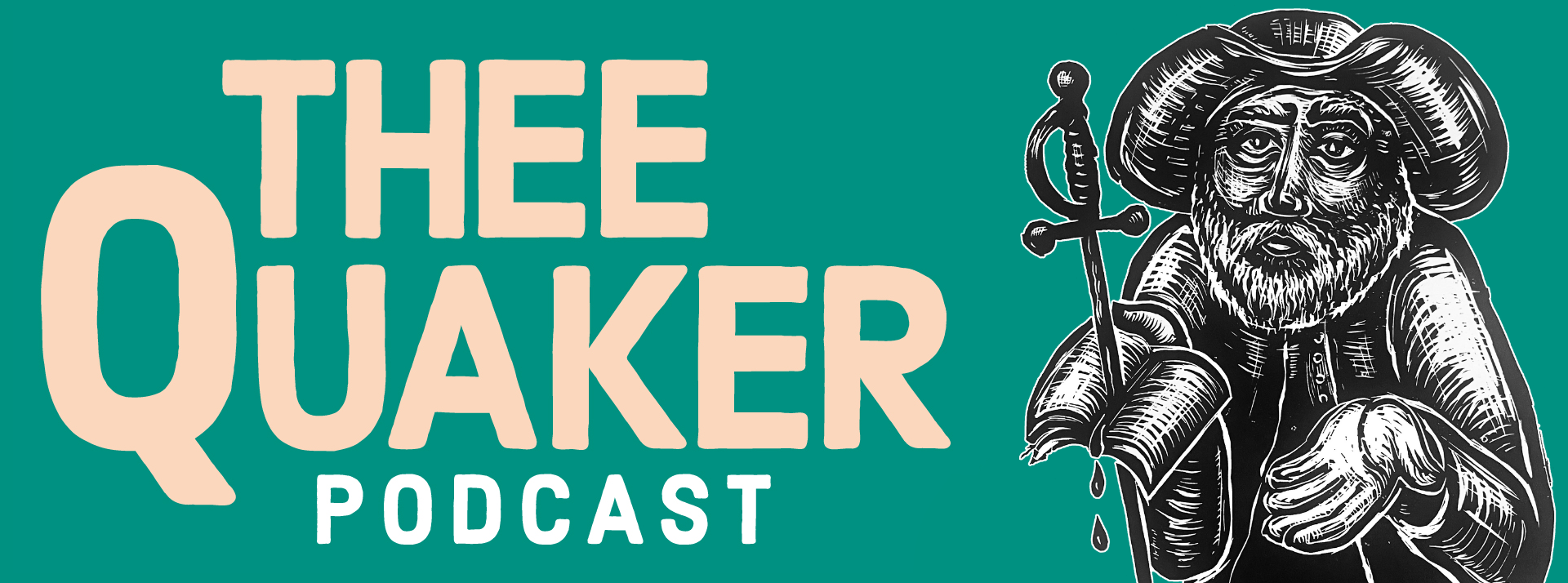

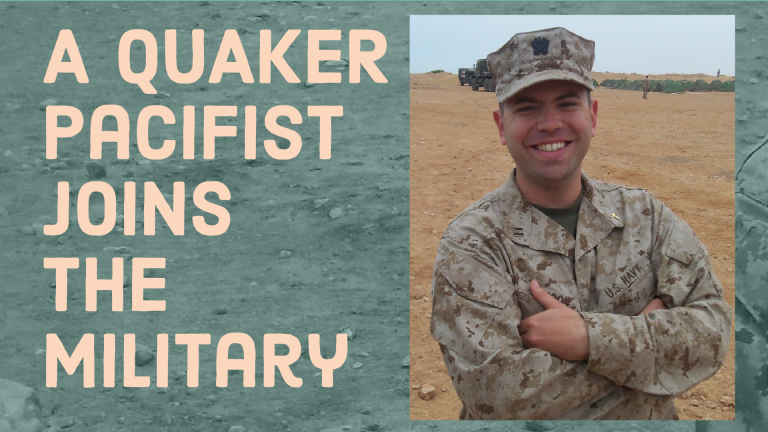
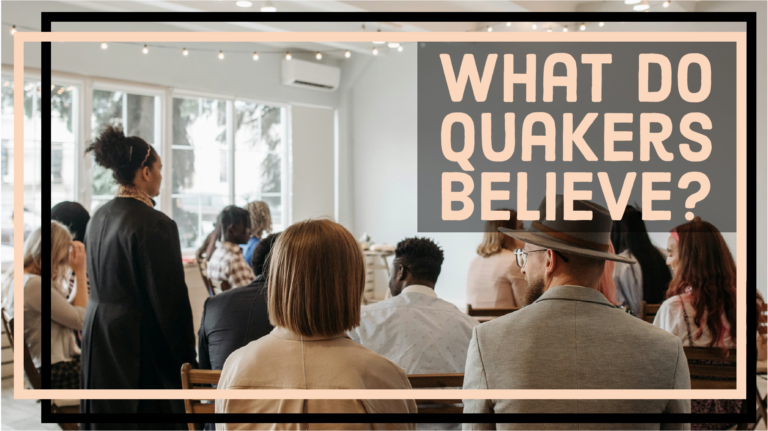
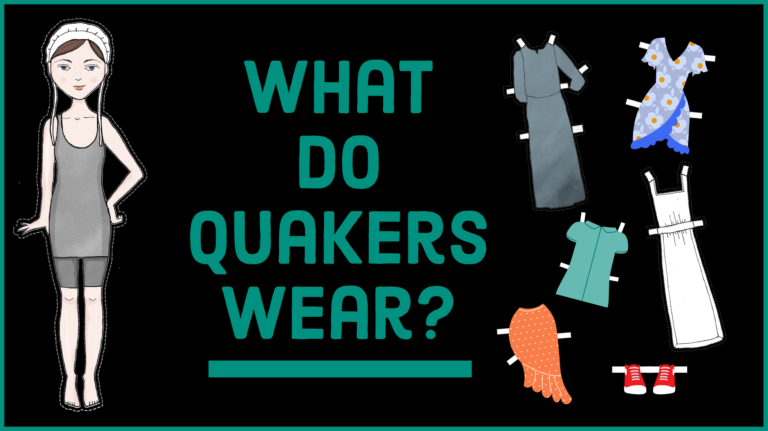

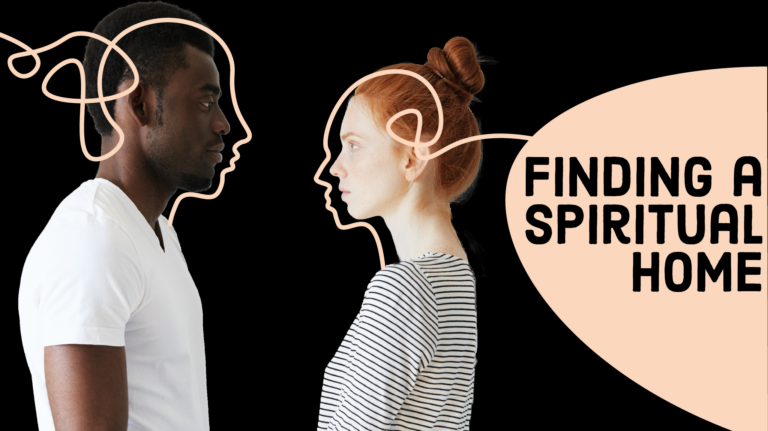
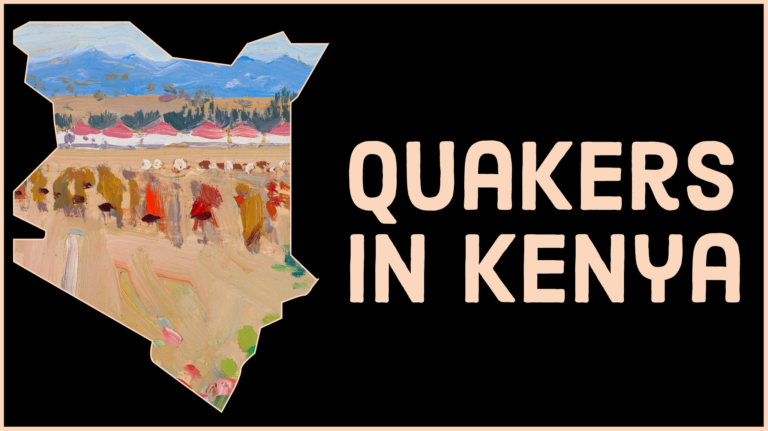
It was an interesting story. I understand that England has different laws regarding free speech than does the US. However, I’m not sure how that impacts the police department’s scope of enforcement. What are they required to do in response to a tip versus what is discretionary. Was it an anonymous tip or a documented complaint from an individual or group of people that lead to the event.
I also thought that it would have been interesting to include information regarding the development of how the local police received and processed leads or information that lead to such a disproportionate response. This was no random event. Somehow or someone shared information with the police department that lead to a forceful move by the police. It would have been interesting to include a bit more from that perspective.
Loved the way they invited the officers to come and join them for tea 🙂